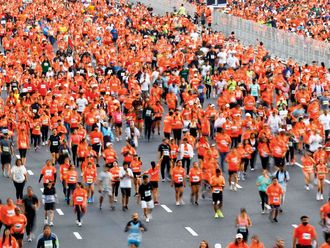
I have been on dialysis for the last one year, and although it’s time consuming to dedicate three days a week to the treatment, leading a normal life is quite possible now,” says Divesh Gandhi, a 55-year-old business man based in Ajman. He’s referring to his dialysis regimen at Thumbay University Hospital, which is done through right arm fistula.
“I was a little bit nervous when I was asked to undergo dialysis, but after being in this facility and treated by the helpful team here of doctors and nurses, I can say it is a true blessing,” says Gandhi. “I am grateful to the team here who made dialysis so seamless for us as patients.”
Dialysis has, of course, saved countless lives — and the treatment has become available to more patients than ever before.
About one in ten adults have chronic kidney disease (CKD), and the vast majority don’t even know it because there are typically no or few symptoms in the early stages of the disease. Worldwide, most of these patients have diabetes and high blood pressure.
For many of them, kidney disease starts-off at one end where you appear fine, but have some kidney damage and progresses to end stage kidney disease. Because the kidneys perform many functions in the body and can be affected by a range of factors within and outside the body, to successfully address kidney disease one needs to look at the problem from a wider perspective.
The main functions of kidneys are toxin/waste removal, water and electrolyte balance, certain hormone production, etc. Chronic conditions like diabetes and hypertension can affect the vascular health of the kidneys. These diseases put you at an increased risk of slowly damaging your kidneys, little by little, over years and decades.
A family history of kidney failure also adds to the risk. In addition, if you have diabetes and kidney disease, the chances are you have heart disease too. Alternatively, obesity in itself can affect kidney function, as it tends to lead to diabetes. Once the population gets heavier, there’s an increased chance of diabetes, and the combination is really bad for the kidneys.
Although, transplant provides complete renal replacement, the scarcity of donor kidneys limits this option. Therefore, for people with end stage kidney disease, hemodialysis works as the best alternative, and keeps them healthy. Following a list of safety checks and controls, being vigilant in the delivery of the service, and an engaged and informed patient, along with dietary modifications, compliance to medications and regular dialysis as per the given schedule is the key to keep dialysis patients healthy.












